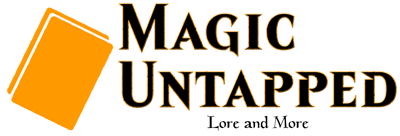In 1999, Wizards of the Coast released the Magic: The Gathering Interactive Encyclopedia CD-ROM for Windows PC.
In 1999, Wizards of the Coast released the Magic: The Gathering Interactive Encyclopedia CD-ROM for Windows PC.
In addition to being a complete card database of every Magic: The Gathering card printed to date (with updates that would come out with each new set), the software also included up-to-date card rulings and R&D notes. Not only that, it also included a deck builder tool, an option to download and import professional Magic decks, and even online player-versus-player gameplay.
In fact, it almost sounds like WotC's Gatherer tool and Magic Online all tied into one (nearly three years before Magic Online was even a thing)!
Watch the video below to learn all about it.
VIDEO TRANSCRIPT
<ON CAM INTRO>
<PKG>
Released in 1999 for Windows, the Magic: The Gathering Interactive Encyclopedia CD-ROM was developed and published under Wizards of the Coast supervision by Saltmine Creative.
The software was meant to be the end-all-be-all reference material for Magic players and included electronic card images, full card text, and original artwork. At launch, it included cards from every set from Alpha to Mercadian Masques. Purchasable updates were later available beginning with Nemesis, available on the day of that set’s release.
In the software, players could access the entirety of the Magic: The Gathering rulebook, including up-to-date Oracle rulings and background notes from Wizards of the Coast R&D themselves.
With a focus on a positive user experience, users could search by card title, rules text, flavor text, artist, and so on – more-or-less what can be found today by using Gatherer on the Wizards of the Coast website.
The Magic: The Gathering Interactive Encyclopedia was not just a reference product, however, as Wizards of the Coast billed it as a robust tool for Magic players as well.
In addition to being an interactive and visual-rich Magic card database, the Interactive Encyclopedia also featured a deck builder tool, which let users create and analyze their own 60-card MTG decks where users would be shows a graphical representation of the balance of their deck (though it didn’t work very well at first – users had to download a patch to get it to work right). Folks could even download and compare tournament-winning decks to their own self-built ones.
Furthermore, users could input their actual paper Magic collection into the software. Once that’s done, they could track their cards and determine if they are available for use in a newly-designed deck. The software even included a web-updatable price guide.
All this isn’t even the cream on the cake, however, as Magic: The Gathering Interactive Encyclopedia marked Wizards of the Coast’s first true foray into the actual playing of Magic via the Internet.
That’s right, this is essentially Magic Online version zero. (No disrespect to the Mana Link feature in the 1995 Magic: The Gathering computer game from Microprose).
Users can connect online and play their created deck against other players who also own the encyclopedia. In fact, player-versus-player is the only way to play Magic: The Gathering online via the encyclopedia as no A.I. opponents exist within the software, which is a huge departure from previous digital Magic recreations such Microprose’s aforementioned computer game.
The experience wasn’t very robust, however. And that’s especially true when you compare it to the actual Magic Online and more modern MTG Arena experiences, but it was something.
Players were put onto a virtual game table and, well, quite simply played Magic: The Gathering complete with coin flips and whatnot. One thing that the encyclopedia had over its more contemporary counterparts is that (other than obtaining each set’s update) all of the cards in the game were free to play – players just had to mark which cards they wanted to include in their decks and “boom.” Done.
Support for Magic: The Gathering Interactive Encyclopedia lasted until December 31, 2002, when Wizards of the Coast announced that they would be discontinuing support for the software and removing all patches and downloads for it from their website, telling users:
“We would like to thank you for your loyalty for this product and apologize for any inconvenience this may cause.”
<ON CAM TAG>









